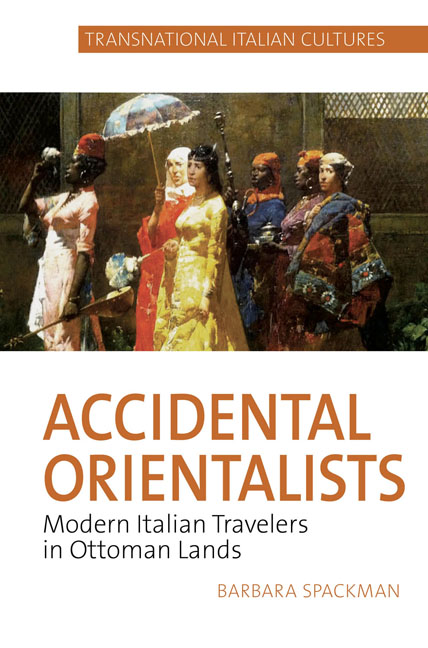Book contents
- Frontmatter
- Contents
- List of illustrations
- Acknowledgements
- Preface
- Chapter One Detourism: The Orientalism of Amalia Nizzoli's Egyptian Memoirs
- Chapter Two Hygiene in the Harem: The Orientalism of Cristina Trivulzio di Belgiojoso
- Chapter Three Male Masquerade in Mecca: Passing and Posing in Nineteenth-Century Egypt
- Chapter Four Muslim in Milan: The Orientalisms of Leda Rafanelli
- Epilogue Divorce Islamic Style: Passing and Posing as Muslim and Tunisian in Postcolonial Italy
- Works Cited
- Index
Chapter Two - Hygiene in the Harem: The Orientalism of Cristina Trivulzio di Belgiojoso
- Frontmatter
- Contents
- List of illustrations
- Acknowledgements
- Preface
- Chapter One Detourism: The Orientalism of Amalia Nizzoli's Egyptian Memoirs
- Chapter Two Hygiene in the Harem: The Orientalism of Cristina Trivulzio di Belgiojoso
- Chapter Three Male Masquerade in Mecca: Passing and Posing in Nineteenth-Century Egypt
- Chapter Four Muslim in Milan: The Orientalisms of Leda Rafanelli
- Epilogue Divorce Islamic Style: Passing and Posing as Muslim and Tunisian in Postcolonial Italy
- Works Cited
- Index
Summary
Some 40 years after Amalia Nizzoli traveled to Egypt, another Italian woman, Cristina Trivulzio di Belgiojoso, offered to unlock the “hermetically closed” harem she had visited during her travels from Anatolia to Jerusalem. A patriot and princess, exceptional woman and anti-emancipationist feminist, Belgiojoso was also a resident in Ottoman lands. But, whereas Nizzoli's detour through the Orient was necessary to “Europeanize” her and make possible her subsequent “Italianization,” Belgiojoso's detour follows a trajectory in which the making of the Italian nation, travel to Ottoman-ruled lands, and entry into the harem line up rather differently. An active proponent of Italian Unification, Belgiojoso sought political exile in the 1830s in order to escape retribution from the Austrian authorities; she chose France, already in many senses her intellectual and cultural “home” as a Lombard aristocrat.1 After the failure of the revolutions of 1848 in Milan and Venice, and of 1849 in Rome, she once again sought exile. But by then deeply disappointed by the role of the French in squelching the Roman republic, during which she played an active role as director of military ambulances, she left Europe entirely to set up residence in Anatolia from 1850 to 1855. Her detour through France was cultural and political, as well as linguistic; with the exception of her 1866 Della presente condizione delle donne e del loro avvenire [Of the Present Condition of Women and of Their Future] and her 1868 Osservazioni sullo stato attuale dell'Italia e sul suo avvenire [Remarks on the Present State of Italy and its Future], Belgiojoso wrote her major works in French, including the majority of the texts that will be of interest to us here. These recount, in three different genres, a second detour through the Ottoman empire: the travel narrative La vie intime et la vie nomade en Orient [Intimate Life and Nomadic Life in the Orient], first published in La revue des deux mondes in 1855), her epistolary collection, Souvenirs dans l'exil [Memories in Exile], written en route to taking up residence in Anatolia in 1850, and her short stories gathered together as Scénes de la vie turque [Scenes of Turkish Life], written after her return to Italy and originally published in the Parisian periodical La revue des deux mondes in 1858.
- Type
- Chapter
- Information
- Accidental OrientalistsModern Italian Travelers in Ottoman Lands, pp. 42 - 89Publisher: Liverpool University PressPrint publication year: 2017



